There are endless marketing tools, from core technologies to very niche solutions, and it isn’t easy to know which tools you need and how your stack of tools will work together. Should you start with your CRM? Do you need a lead capture tool? You’re caught between wanting access to all the marketing capabilities you need and trying to avoid overspending on overlapping technologies and features you don’t need.
The best way to choose the right mix of marketing tools is to understand what marketing functions you need and which tools can provide them. In this post, we’ll cover what marketing tools are and their main categories. Then, we’ll dive into each category to learn what to look for and cover some of the top tools to choose from.
What are marketing tools?
Let’s start at the beginning: a marketing tool is any technology or software that enables you to perform marketing activities. These tools can be marketing software central to your day-to-day operations (like a customer relationship management system) or apps for very specific uses (like creating tracking links). There is a wide range of options, from free marketing tools to enterprise-level marketing automation systems.
Marketing tools for small business
Like other brands, small businesses need marketing tools (like our small business marketing automation software), but the types of tools they need can be very different from an enterprise.

Small businesses should evaluate tools based on their current needs and how they plan to scale their business in the coming months and years. Small businesses also need to pay close attention to pricing structure. Some tools charge flat rates, others charge per seat, and others charge by the number of accounts. A cost-effective tool for a large business might be prohibitively expensive for a small business.
Small businesses should also consider how much work they will have to put into a tool. Some marketing products require coding to integrate with other systems. Those without development skills or resources should probably look elsewhere.
What are the 7 types of marketing tools?
There are tools for just about everything, but most fall into 7 basic categories. For many businesses, these are the most important tools to research.
The top 7 types of marketing tools are:
- Customer relationship management (CRM)
- Marketing automation
- Social media
- Lead capture and conversion
- Advertising
- Search engine optimization (SEO)
How to choose the right marketing tools
For each tool, you should consider a few main factors as you choose which is right for your business.
- Key features and functions: First and foremost, your tool should perform the necessary tasks. As we walk through each tool, we’ll point out the most common features to look for.
- Integrations: Life is much easier when your online marketing tools work together. That is why integrability is such an important factor, especially for small businesses that might not have the resources to build their own integrations.
- Customer support: You’re bound to run into issues even for tech-savvy customers. Look at the quality of support and what kind of support is included in your plan.
- Pricing: For any tool, there are solutions for a range of price points. Compare your spending with the value each tool brings to your business.
20 top marketing tools
Here are more details on each category of marketing tools. We also provide some of the top choices in each category.
Customer relationship management (CRM)
Customer relationship management (CRM) is a tool that holds all your account records and enables you to manage interactions with your customers. A CRM helps your team record and share customer information to provide a better customer experience.
The top features you should look for are contact management, lead scoring, and reporting and analytics.
1. ActiveCampaign
ActiveCampaign is a CRM designed to unite sales and marketing teams with up-to-date information and time-saving workflows. With robust automation capabilities, it’s used by more than 150,000 customers. Beloved by small- and medium-sized businesses, ActiveCampaign also has solutions for enterprise organizations.
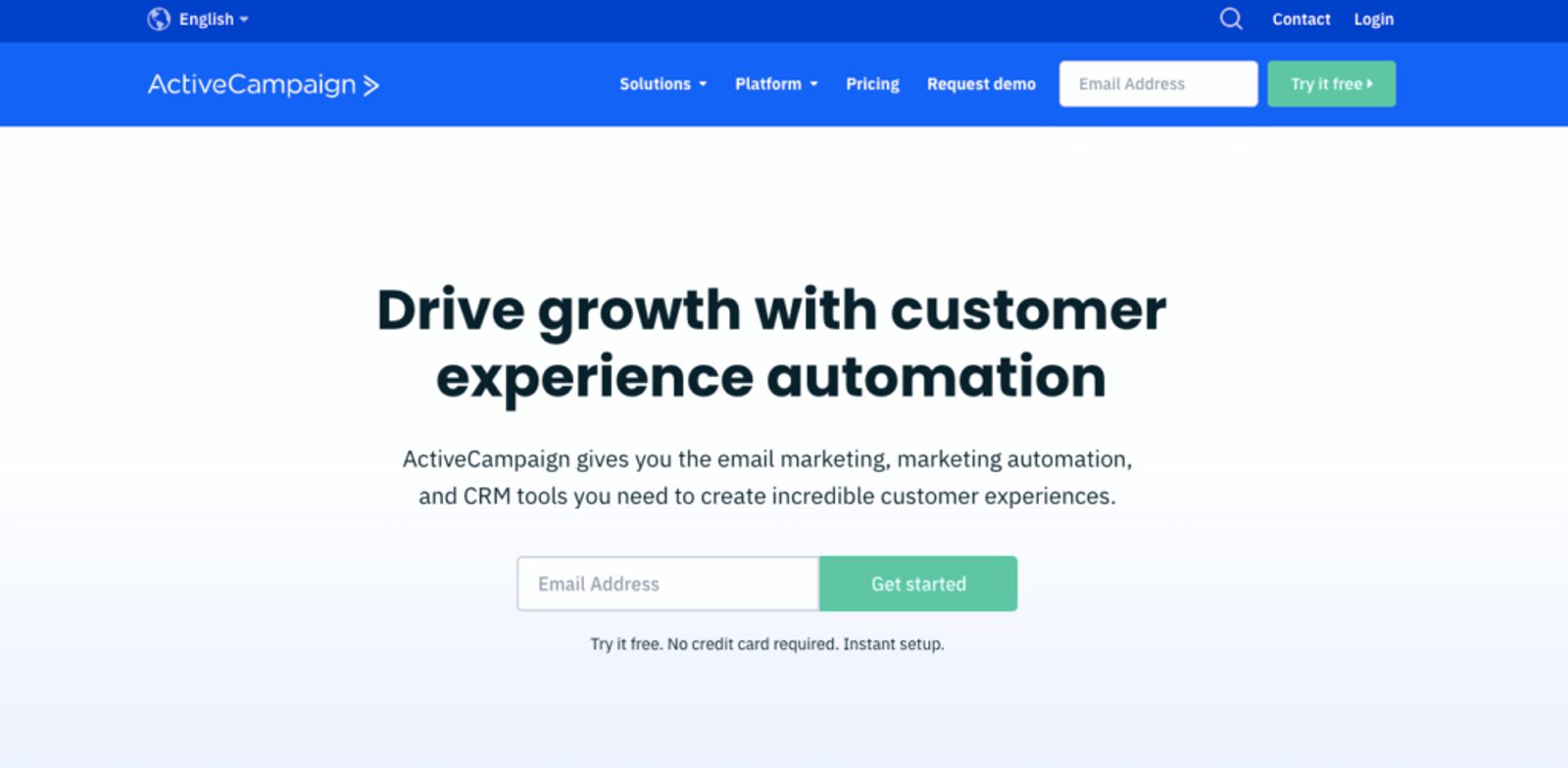
Standout features
- Automated communications: ActiveCampaign’s segmentation and marketing automation capabilities allow you to deliver more personalized communications with less effort. Sales reps can send automated personalized emails.
- Automated sales workflows: ActiveCampaign’s workflows make it easy to automate time-consuming sales tasks, like updating contact details and creating tasks.
- Partner network and user community: With more than 150,000 customers and a vast field of partners, there’s always someone to learn from.
Click here to sign up for a 14-day free trial.
2. Zendesk Sell
You may know Zendesk as a customer service platform, but they also offer a CRM solution called Zendesk Sell.

Standout features
- Enrichment and prospecting: Researching contacts can eat up a lot of time, so Zendesk Sell’s Reach feature helps users search for new prospects or gather more relevant data to existing leads (enrichment).
- Pipeline analysis: Zendesk Sell emphasizes giving users a holistic view of the sales pipeline. It offers pipeline development reports and allows salespeople to add forecasting data.
- Task Player: Zendesk Sell has a Task Player feature to help them operate more efficiently. It queues up sales and marketing tasks, such as phone calls, emails, and reviewing documents.
3. Salesforce Sales Cloud
Salesforce is a big name in the world of software-as-a-service products, and it all began with their CRM. It’s most popular with enterprise businesses because of its many add-on tools and scalability.
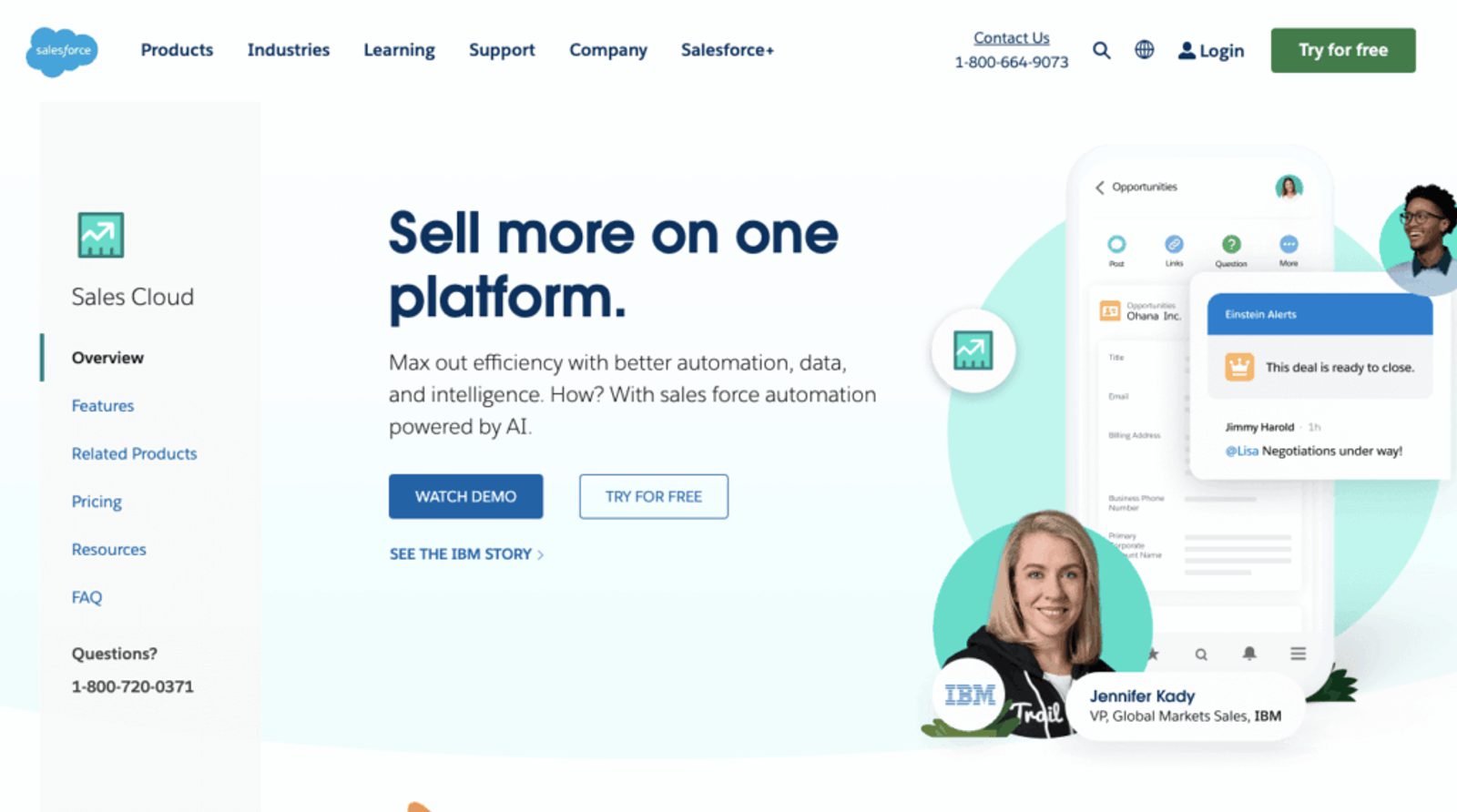
Standout features
- Lead and opportunity management: Salesforce Sales Cloud can handle complex databases of leads, opportunities, and existing customers.
- Process Builder: With the CRM’s Process Builder, you can create automation workflows for assigning tasks, email alerts, and different stages of the buying cycle.
- Automated approvals: For large organizations or those with a long and complex sales process, automating approvals for discounts and other tasks reduces delays.
Marketing automation tools
Marketing automation is all about saving time and effort for both you and your customers. It frees you from repetitive tasks by automating things like campaign management email sends,
audience segmentation, and A/B testing.
Look for a platform that takes work off your plate with pre-built automations and the ability to create workflows.
1. ActiveCampaign
ActiveCampaign is a robust marketing automation tool with a CRM built right in. This allows both marketing and sales teams to get more done in less time.
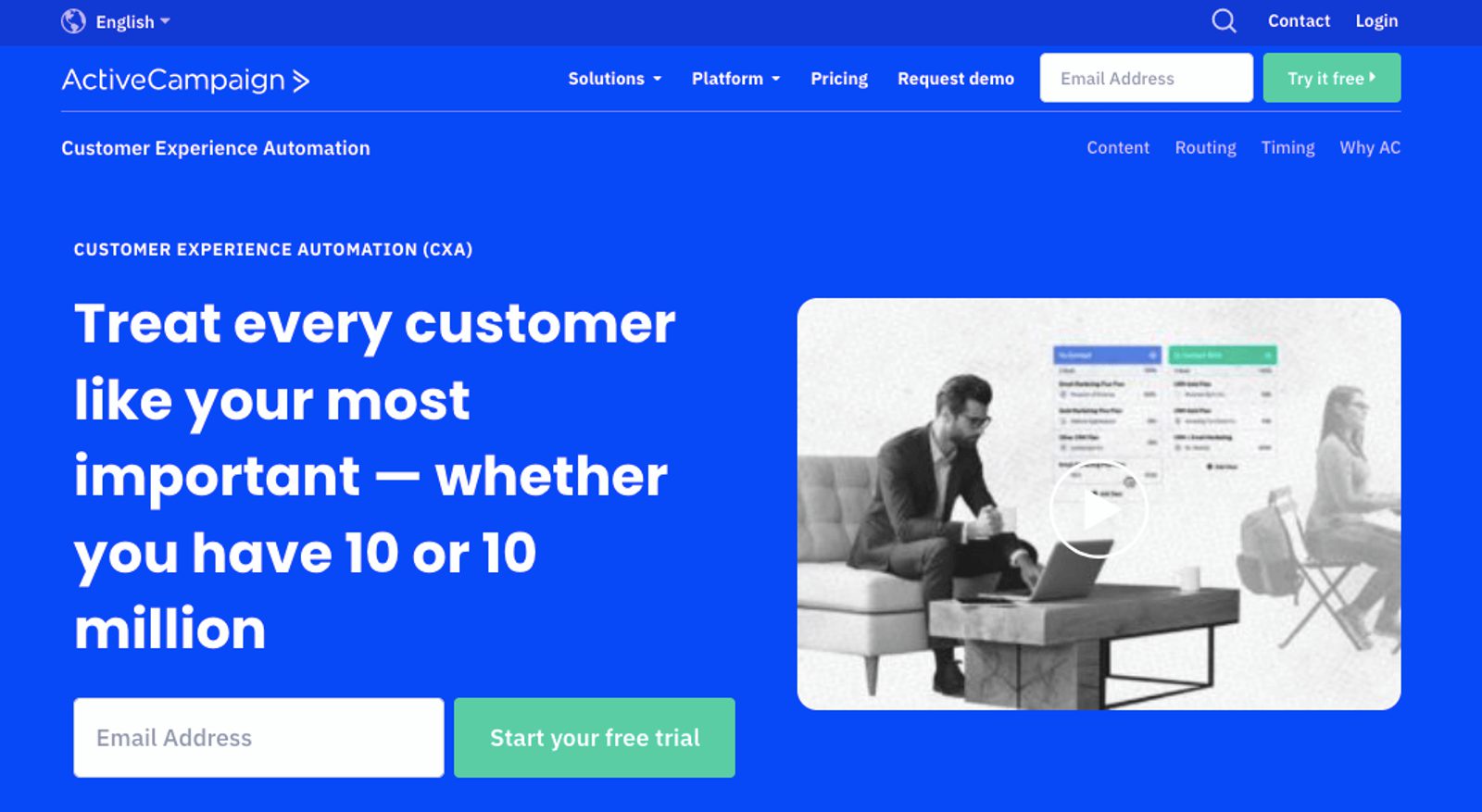
Standout features
- Automation recipes: With more than 800 marketing automation “recipes,” you can set up advanced workflows in a few clicks. There are recipes for abandoned cart reminders, free trial email sequences, and task creation, to name just a few.
- 850+ integrations: Marketing and sales automations often plan multiple channels and tools, from email to social media to project management. ActiveCampaign’s huge library of integrations makes connecting with your other apps and tools easy.
- Predictive actions: ActiveCampaign uses machine learning to analyze data on past deals and offer suggested actions to optimize each stage of the buying cycle and boost your marketing efforts.
2. Freshsales
Freshsales’ parent company, Freshworks, is probably best known for the customer service product Freshdesk. They’ve now expanded to offer sales, marketing, and HR tools.
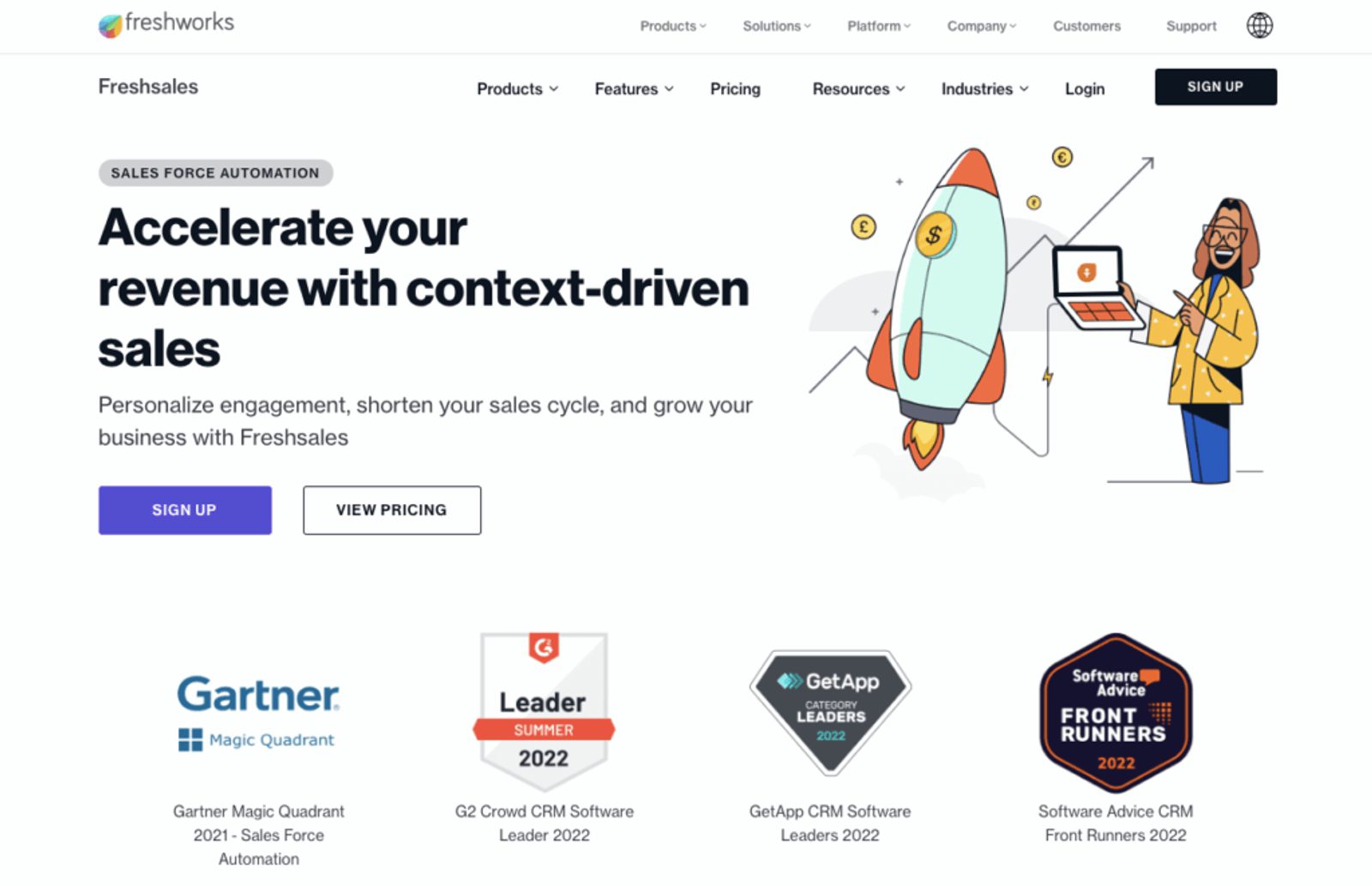
Standout features
- Workflow templates: Freshsales has a library of workflow templates for common automations. You choose a template, set conditions, and start automating.
- AI-powered chatbots: To give prospects and customers instantaneous support without a huge team, Freshsales offers AI-powered chatbots for which you can build custom flows.
- Auto-assignment rules: Freshsales allows you to create rules to assign contacts to the right team members automatically.
3. Creatio
Creatio bills itself as a CRM but focuses on bringing automation to sales, marketing, and customer service—all with no coding.
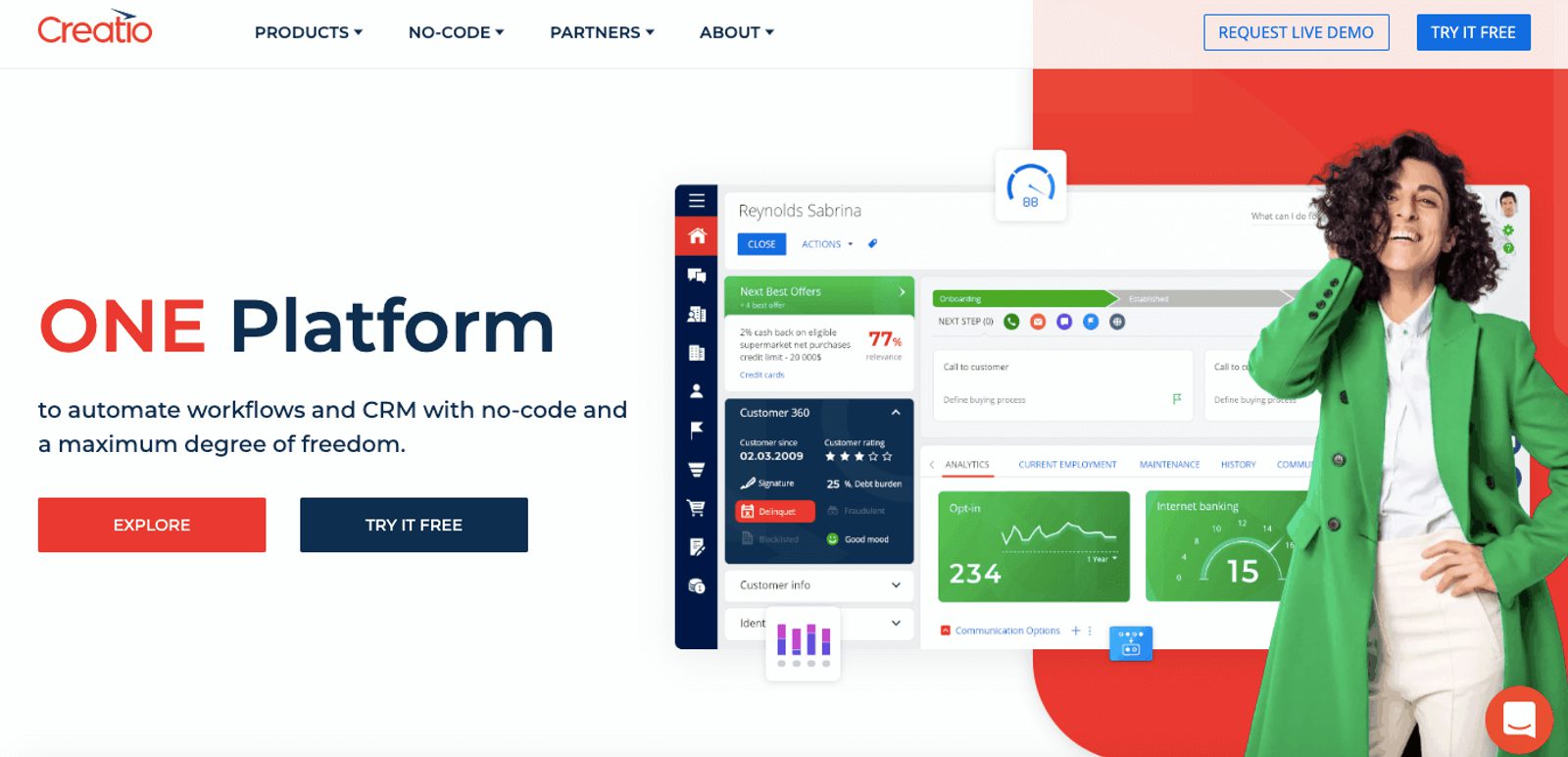
Standout features
- Automated marketing campaigns: With Creatio, you can build multi-channel marketing campaigns that deliver the right content through the right marketing channels.
- Website behavior tracking: To help you offer more personalized content and communications, Creatio can track how potential customers arrive at your site, their paths, and how long they spend.
Email marketing tools
Email is the lifeblood of business communication, but the email marketing tool you choose can make a big difference in how effective your messages are. Look for a tool that makes it easy to build, test, and customize emails and campaigns for your digital marketing strategy.
1. ActiveCampaign
We hope we’re not getting too repetitive, but 1 of ActiveCampaign’s most valuable capabilities is email marketing. From behavior-based workflows to analytics, the platform helps you unlock the power of smart, contextual email campaigns.
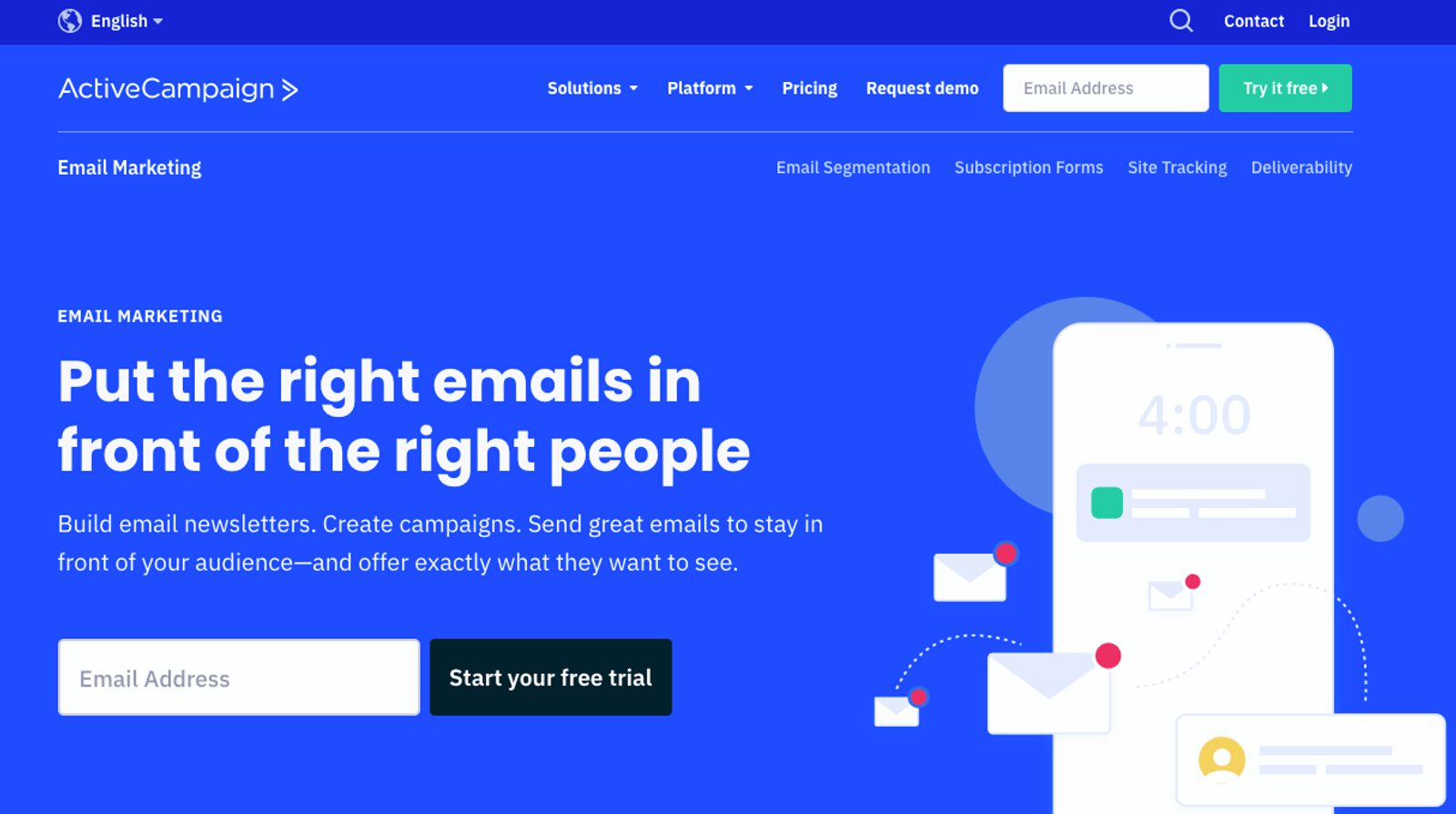
Standout features
- Intuitive email designer: The drag-and-drop email designer allows you to make beautiful, branded emails with images, videos, buttons, and more—all without coding.
- Advanced segmentation: Because it is also a CRM, ActiveCampaign has the customer data to segment your audience for more relevant emails easily.
- Email automation recipes: Any email marketing platform can send an email when you tell it to, but ActiveCampaign’s pre-built automation recipes mean it knows how to send the right email automatically when a customer takes action.
2. GetResponse
GetResponse is an email marketing tool emphasizing its easy-to-use design interface and deliverability.
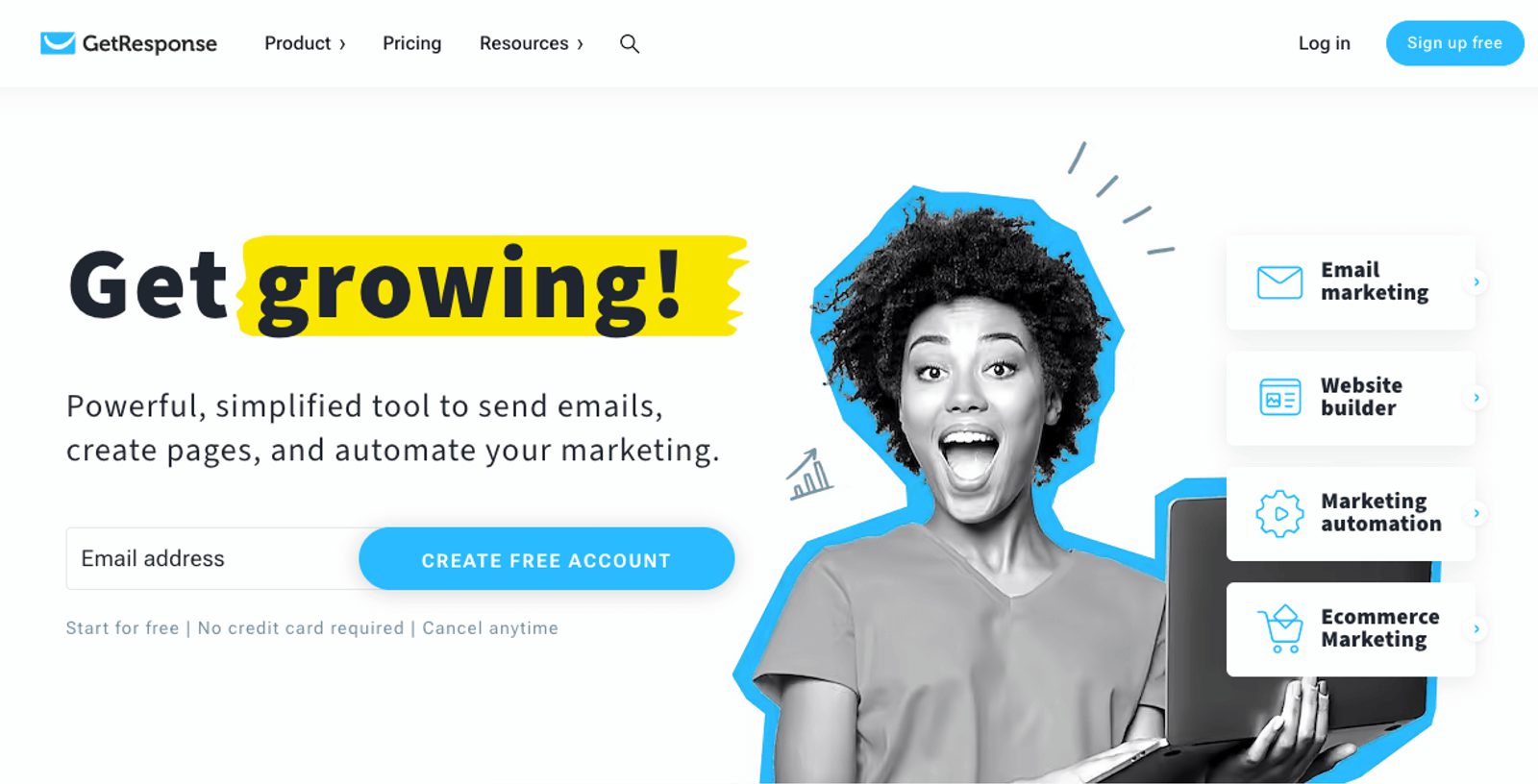
Standout features
- Drag-and-drop Email Creator: GetResponse’s Email Creator allows you to build customized, no-code emails with a drag-and-drop interface.
- Templates and media library: To keep your emails visually engaging, the platform has a built-in library of email templates as well as free images and GIFs.
- Mobile app: If you want to be able to monitor campaigns and performance from anywhere, GetResponse has a mobile app.
3. Adobe Marketo Engage
Marketo is the email marketing arm of Adobe’s massive suite of software products. It’s most popular with mid-market and enterprise businesses.
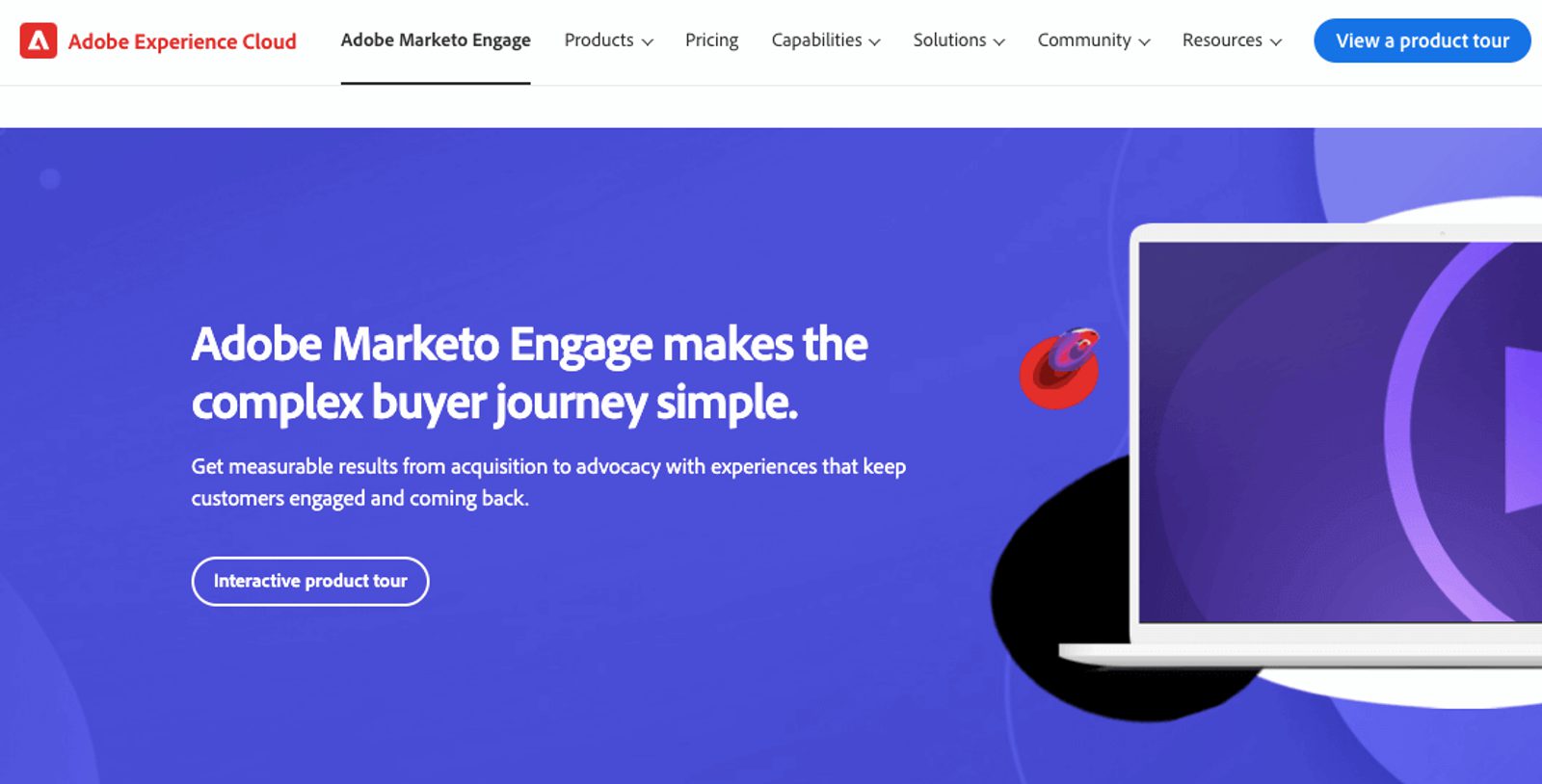
Standout features
- Content personalization: To deliver the most relevant content to each account, Marketo offers dynamic content in emails and landing pages.
- A/B testing: Marketo allows you to A/B test various email elements. You can even perform the test on a small batch and send the winner to the rest of the list.
Social media marketing tools
Keeping all your accounts current is a challenge with so many different social media platforms—each with different types of content. Good social media marketing tools help you to plan, create, schedule, publish, and analyze your social media channels.
1. Buffer
Buffer is a social media management tool that helps you to tell your brand’s story across Twitter, Instagram, LinkedIn, Pinterest, TikTok, and more.
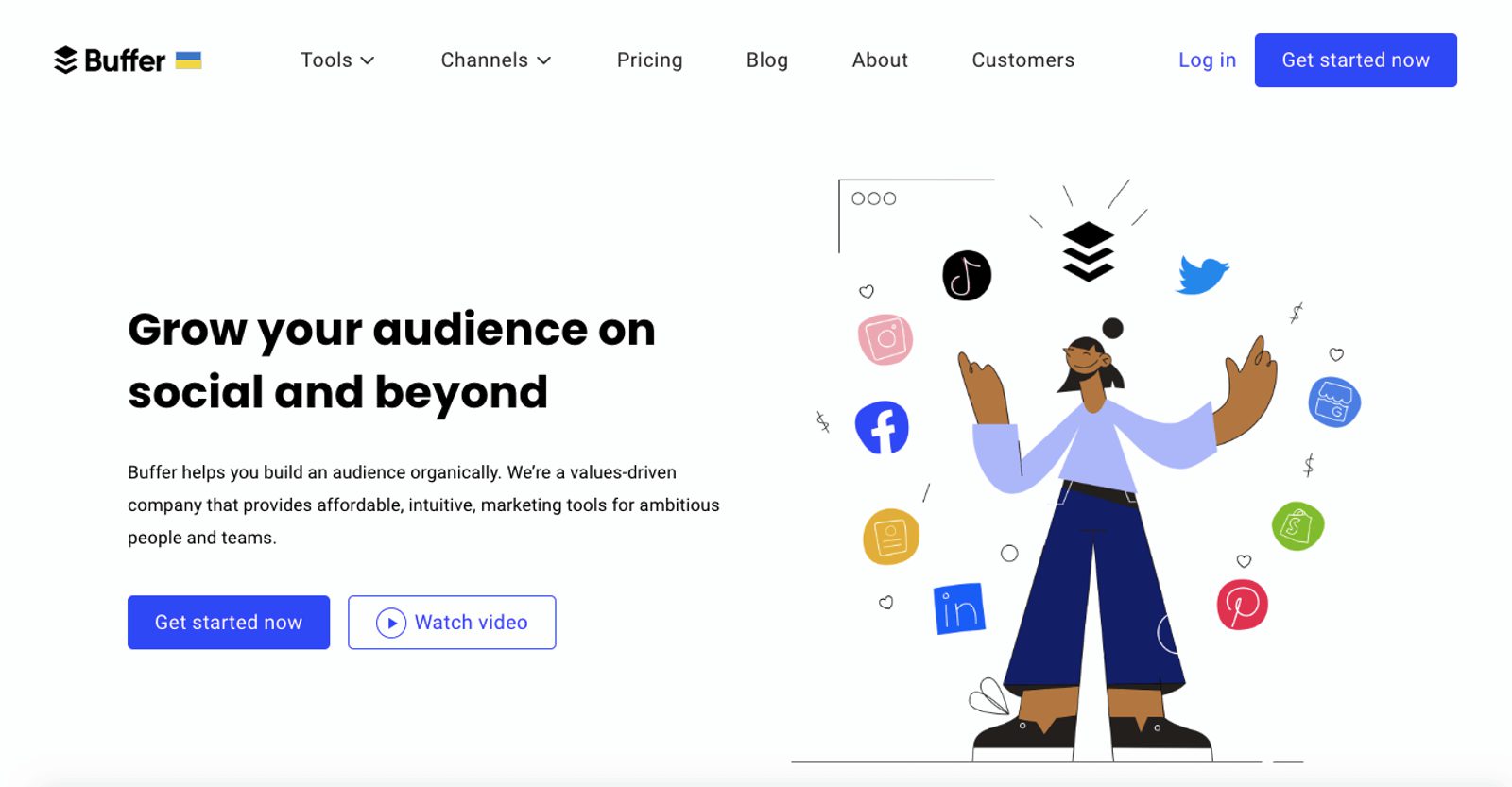
Standout features
- Comprehensive social dashboard: Buffer gives you a place to see all your posts across different channels, including publishing times.
- Social engagement tools: To connect with your followers, you can see all your comments and interactions within Buffer and comment back. Smart alerts show you which comments you should address first.
2. SproutSocial
SproutSocial is an all-in-one social media management tool that emphasizes its ability to analyze and draw business value from your social media profiles.
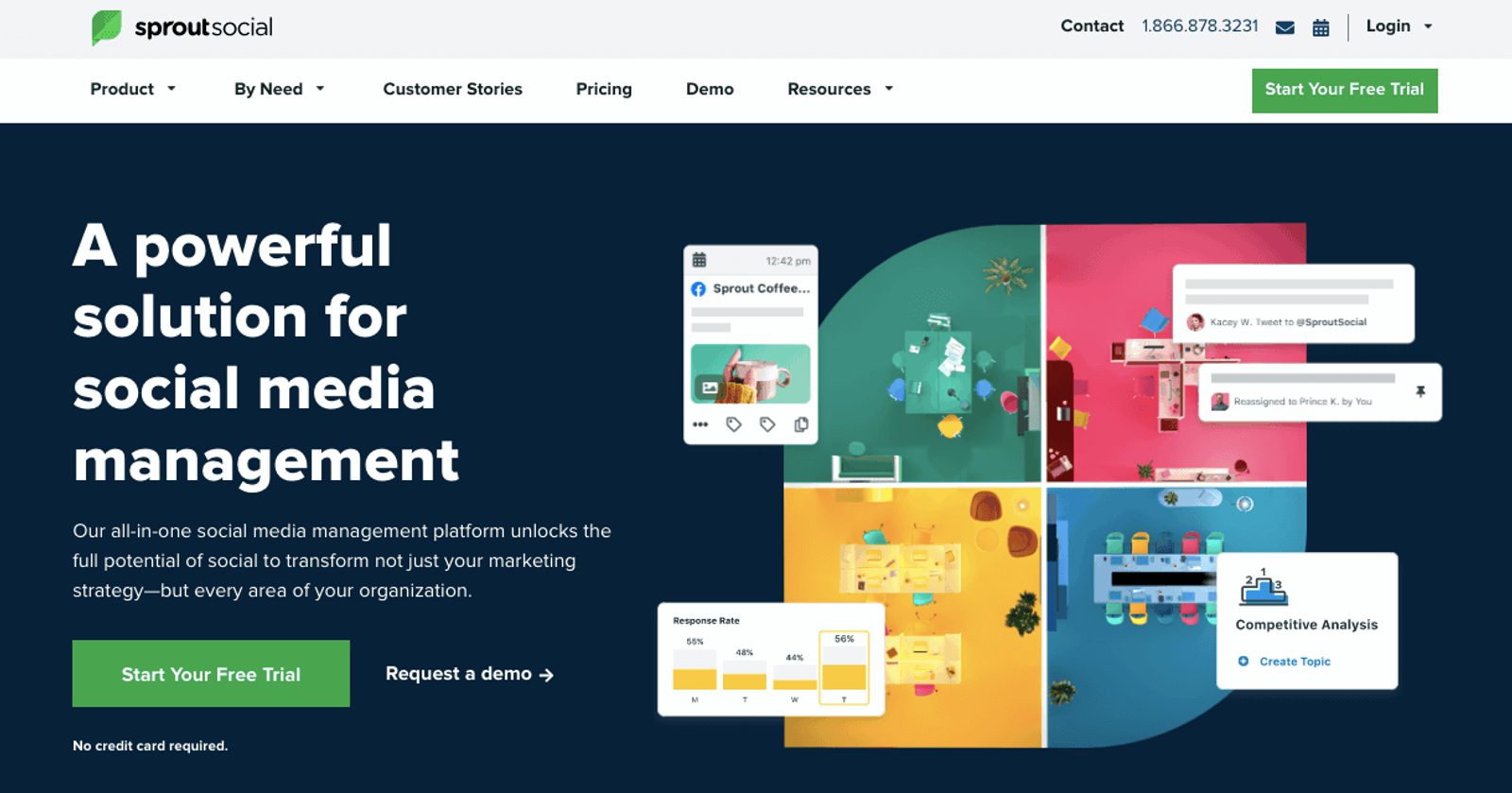
Standout features
- Social listening: Along with its ability to create and schedule posts, SproutSocial enables social listening so you can stay aware of what customers are saying about your brand.
- Ecommerce integrations: Within SproutSocial, you can connect your product catalogs in Shopify, Facebook, and Instagram.
3. Hootsuite
Hootsuite has claimed the “world’s first social media management platform” title. They’ve been learning and refining their tool for more than a decade.

Standout features
- HootSuite Planner: The Hootsuite Planner is your centralized calendar for scheduling social media posts across all your channels and social campaigns.
- Monitor trends and competitors: Set up your preferences to keep your finger on the pulse of social trends and use social listening to keep an eye on competitors.
4. Canva (AI Video Generator)
While Canva is widely recognized for its design capabilities, it's the AI Video Generator that's setting a new standard for social media content creation. This innovative feature not only empowers brands to craft visually captivating videos but does so with an ease that’s perfect for the fast-paced demands of social media marketing.
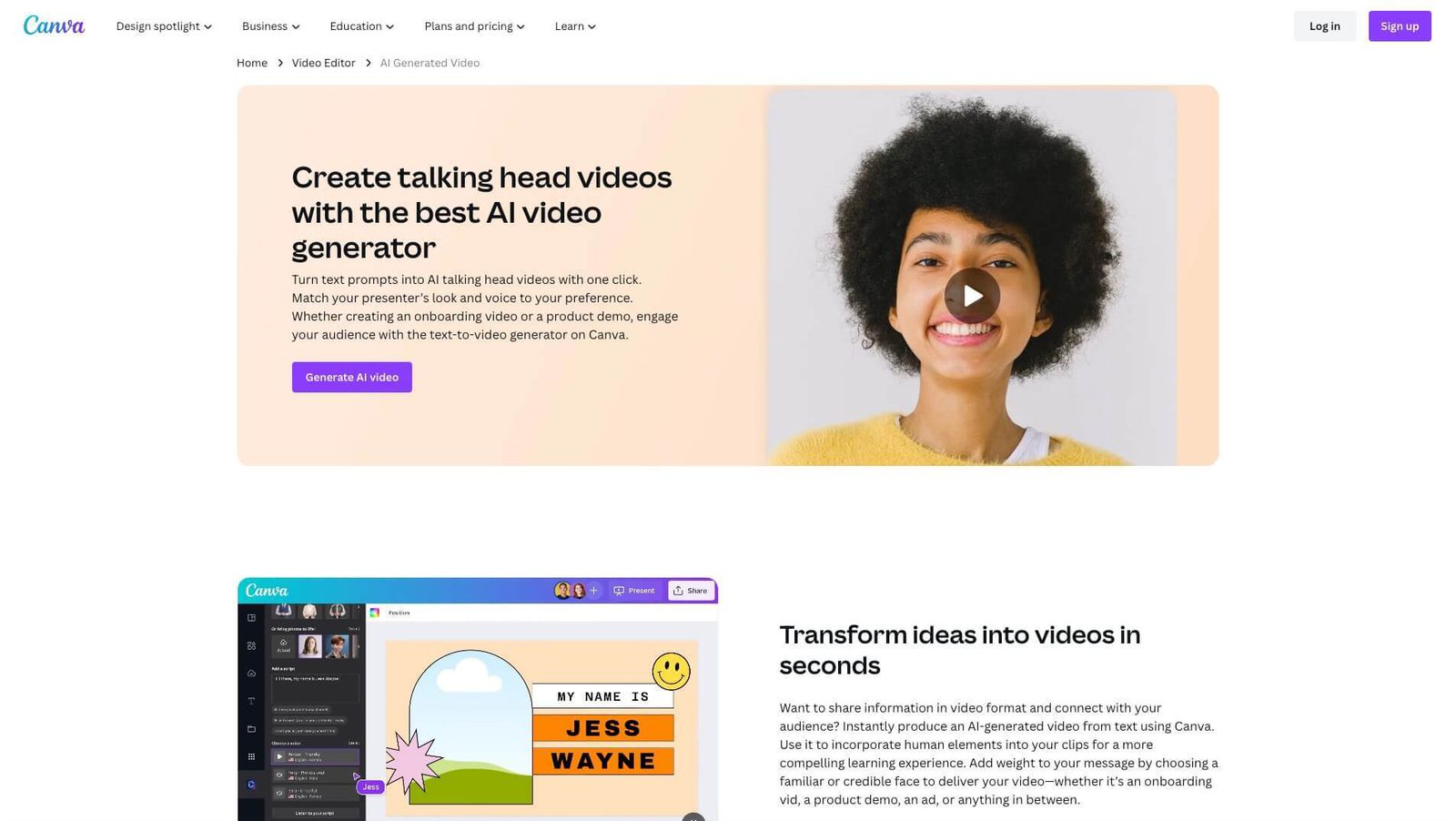
Standout features
- Automated Content Review System: Canva’s commitment to a secure user experience is evident with its automated content review, ensuring videos are free from offensive material and align with community standards.
- Enhanced Customization with Canva’s Photo Video Editor: Dive into Canva’s treasure trove of creative assets to personalize your AI-generated videos, adding elements that reflect your brand’s unique voice and message.
- Collaborative Real-time Brainstorming: Magic Media’s Text-to-video encourages teams to collaborate in real-time, transforming collective ideas into compelling video narratives that resonate with audiences.
Lead capture and conversion tools
Leads are the lifeblood of business, so you shouldn’t discount the lead capture and conversion experience. Look for a tool that allows you to create and share forms and easily collect and compile the information you need.
1. ActiveCampaign
Since ActiveCampaign can store all your lead and account records, we also have tools to capture, nurture, and convert leads.
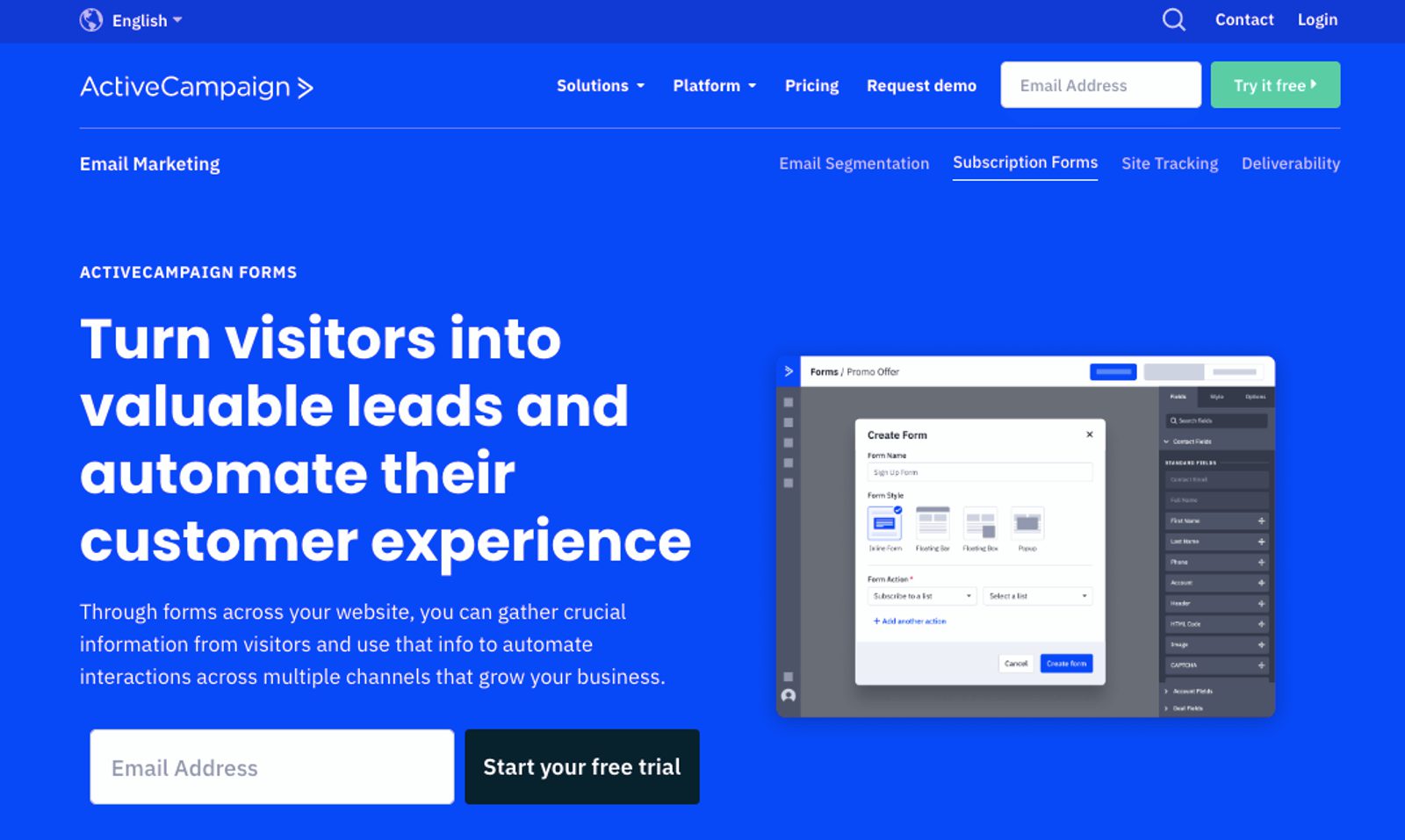
Standout features
- Custom forms: With ActiveCampaign, you can build custom forms and embed them into your website. You can then use automation to turn form-fills into contacts and leads easily.
- Immediate follow-up: Response speed can be the difference between closing and losing the deal. In ActiveCampaign, you can use pre-built or custom automations to assign a salesperson to get in touch in minutes.
Marketing Tools For Every Need
2. Typeform
Typeform is a highly specialized tool for creating customized forms, surveys, and quizzes with a clean, friendly look.
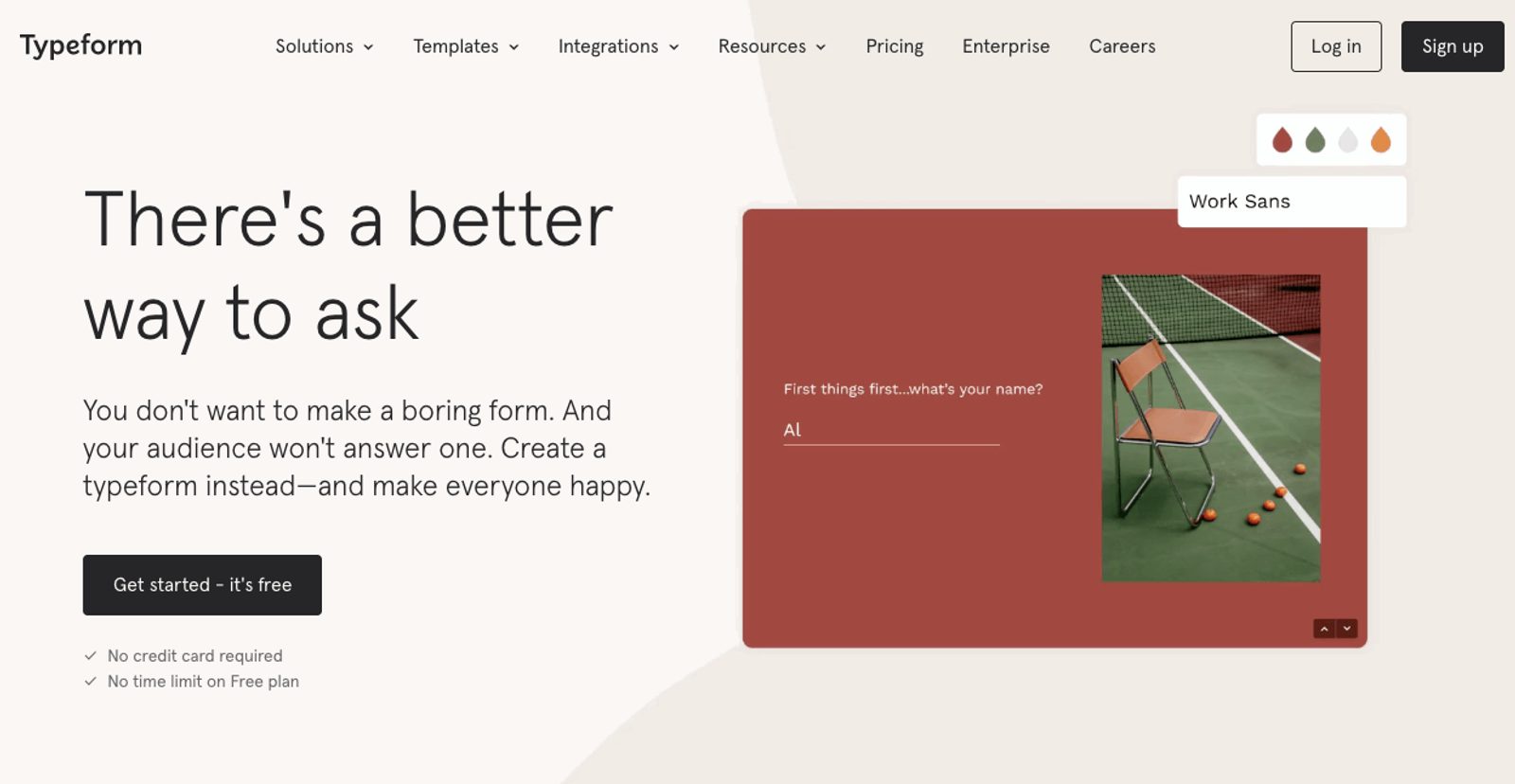
Standout features
- Template library: Typeform has templates for just about any situation, including newsletter signups, trivia quizzes, customer feedback questionnaires, and order forms.
- CRM integrations: Lead information only starts delivering value when you can view and collect it. Typeform has pre-built integrations to popular CRMs like ActiveCampaign, monday.com, and Pipedrive.
3. Convertful
Convertful is a lead capture tool that can produce various forms and customer interaction modules without coding.
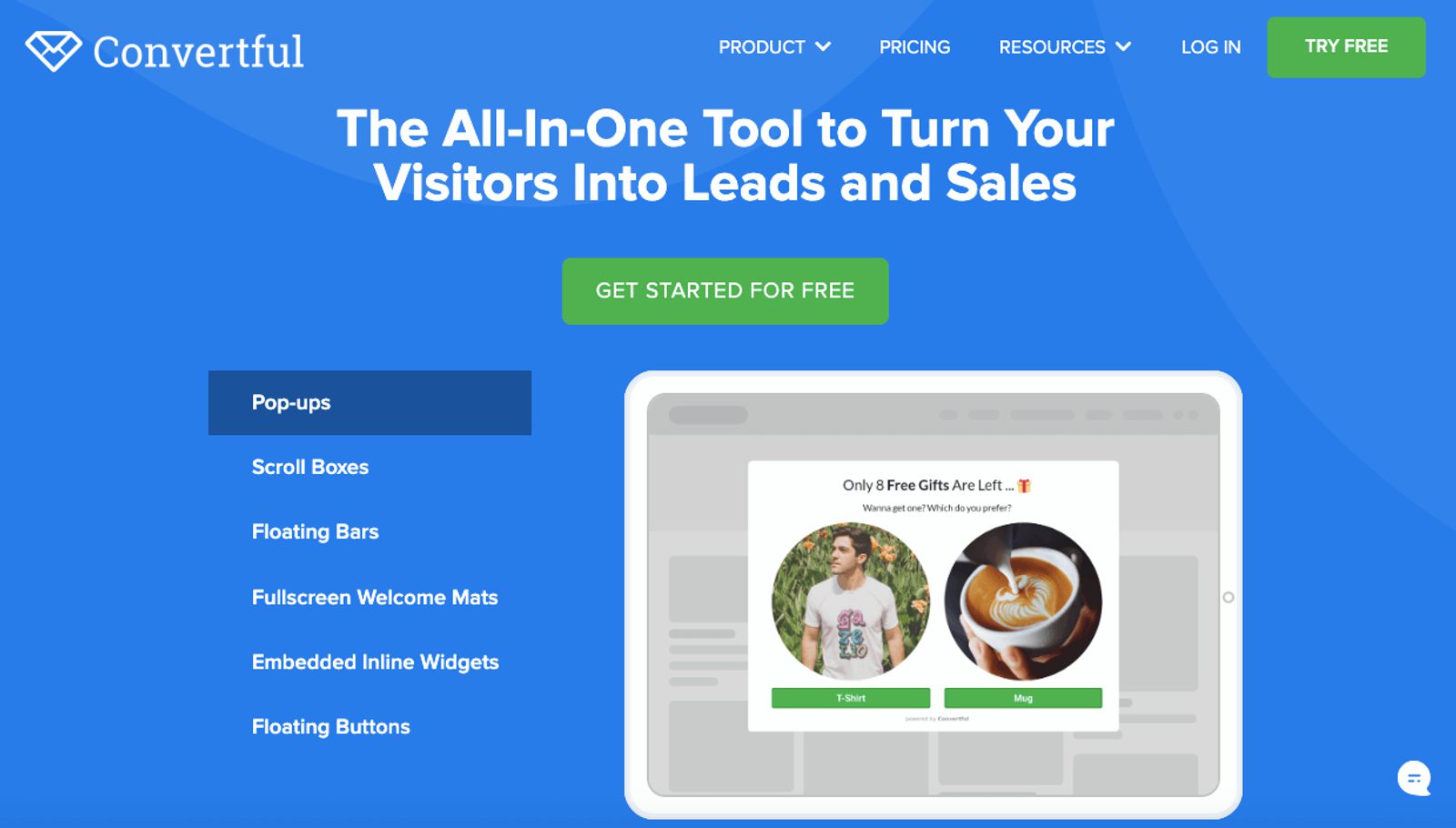
Standout features
- Drag-and-drop editor: For a fully customizable experience, Convertful’s drag-and-drop editor supports unlimited form fields. You can even customize a form’s layout and where it appears on the screen.
- 100+ templates: You can also start with 1 of their 100+ form templates, including straightforward email subscriptions to segmentation surveys and personalized offers.
Advertising tools
As big as content marketing and inbound marketing have become, paid advertising is still a vital lever that your brand should use. Advertising tools help you manage your different ad platforms and analyze ad performance. Look for a tool that shows you what’s working and opportunities to jump on.
1. Google Ads and Keyword Planner
Google is ground zero for digital advertising. They made more than $220 billion in ad revenue in 2022. Google Ads is Google’s paid ad platform, and users can access the Keyword Planner tool for free.
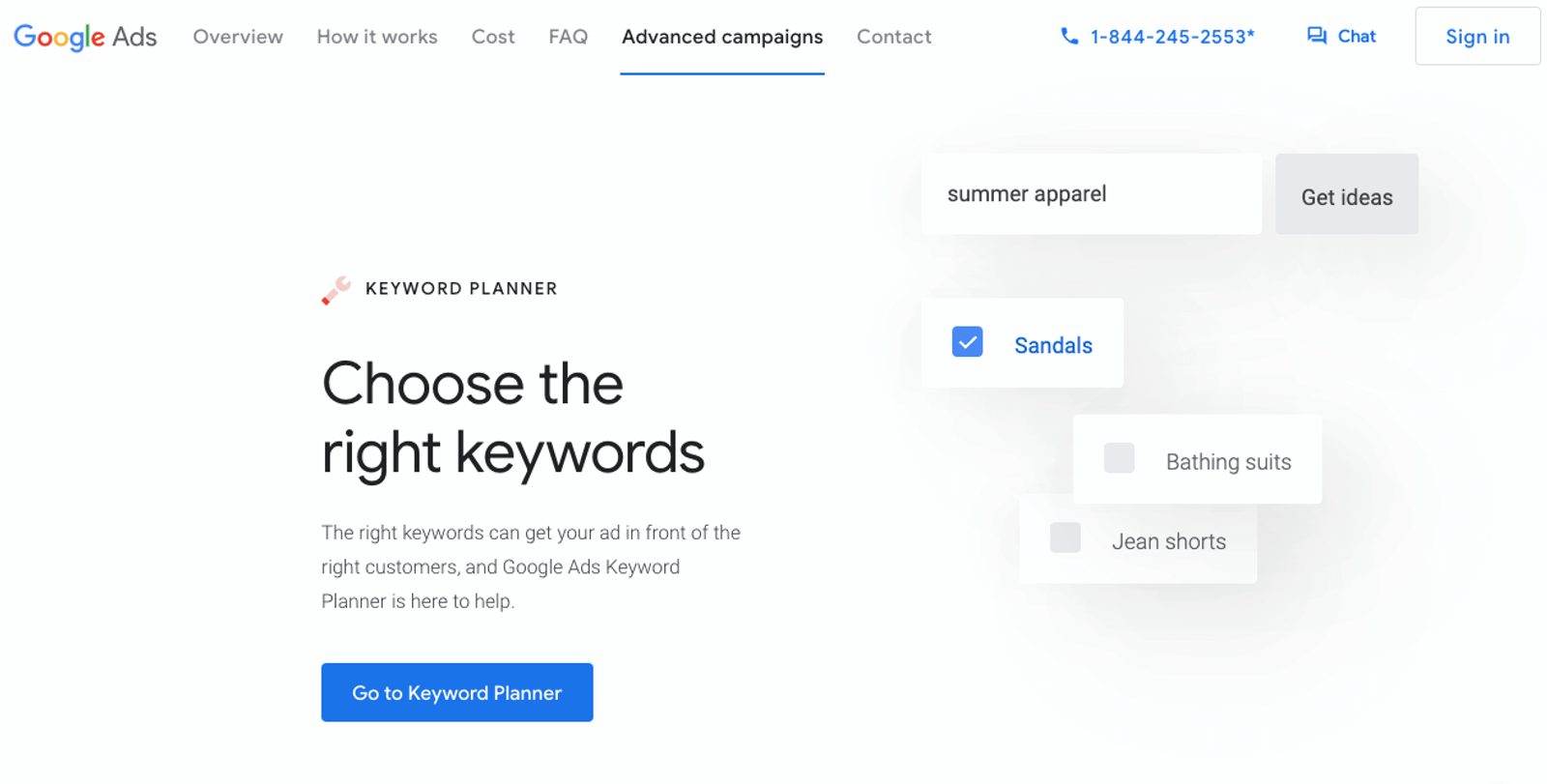
Standout features
- Find and target keywords: With Keyword Planner, you can search for the best keywords for your business and determine how often your business is searched and how much competition you face.
- Control your budget: Google prices ad placements based on the number of searches and level of competition. Within Google Ads, you can set budgets for particular keywords and campaigns to keep from going overboard.
2. DataFeedWatch
DataFeedWatch is a multichannel e-commerce platform that empowers businesses to maximize their product sales across diverse advertising channels and marketplaces. Select from over 2000 ad channels and marketplaces across 60 countries and benefit from top-rated customer support among feed providers.
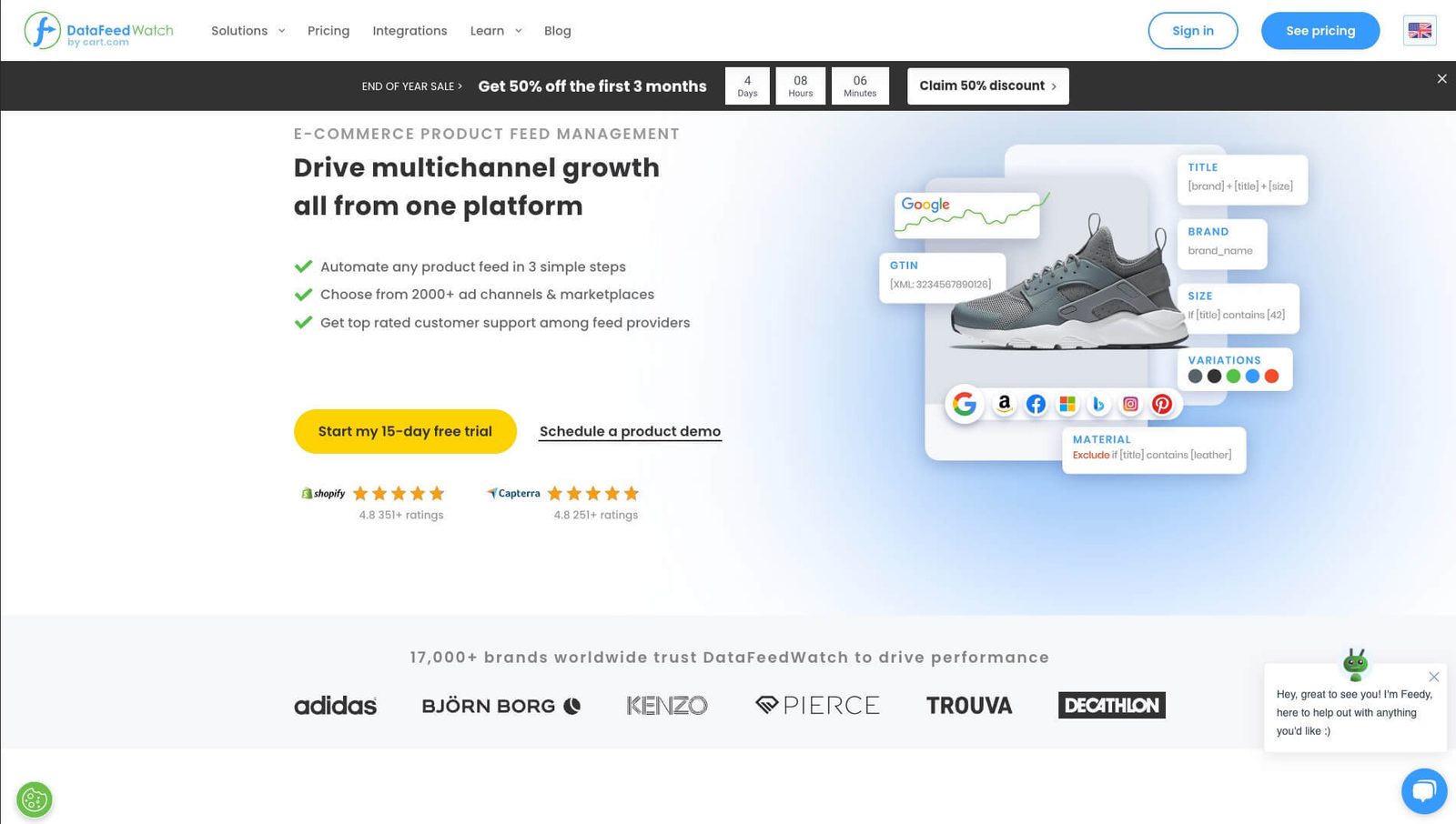
Standout features
- Manage multiple data feeds in one platform, where channel requirements are pre-loaded for automatic generation in the correct format. Automate product feeds for efficiency and speed—new products are seamlessly added, and feeds are updated and sent to your channels hourly.
- Start selling on marketplaces with ease by importing all your listings seamlessly. Keep your inventory and prices updated easily. Quickly publish or edit bulk listings on Amazon, eBay, Bol.com, Fruugo, and more. Prevent Amazon listing errors with automated pre-validation.
- Transform product feeds into dynamic text ads effortlessly. Automatically generate compelling text ads for every item in your catalog. Update ads and keywords for thousands of products in mere minutes, with changes reflected whenever you add or remove a product.
3. AdRoll
Designed for ecommerce brands, AdRoll is a platform where you can manage display and social media ads.

Standout features
- Retargeting ads: Almost like a cart abandonment email, a retargeting ad reminds customers of a product or service they were checking out before. AdRoll uses machine learning to identify retargeting opportunities by customer behavior.
- Holistic data: Because it manages ads across many platforms, AdRoll compiles all your performance data for a comprehensive look at how ads perform.
4. SharpSpring Ads
SharpSpring is probably best known for its CRM, but it created SharpSpring Ads to allow brands to manage all their advertising in 1 place.
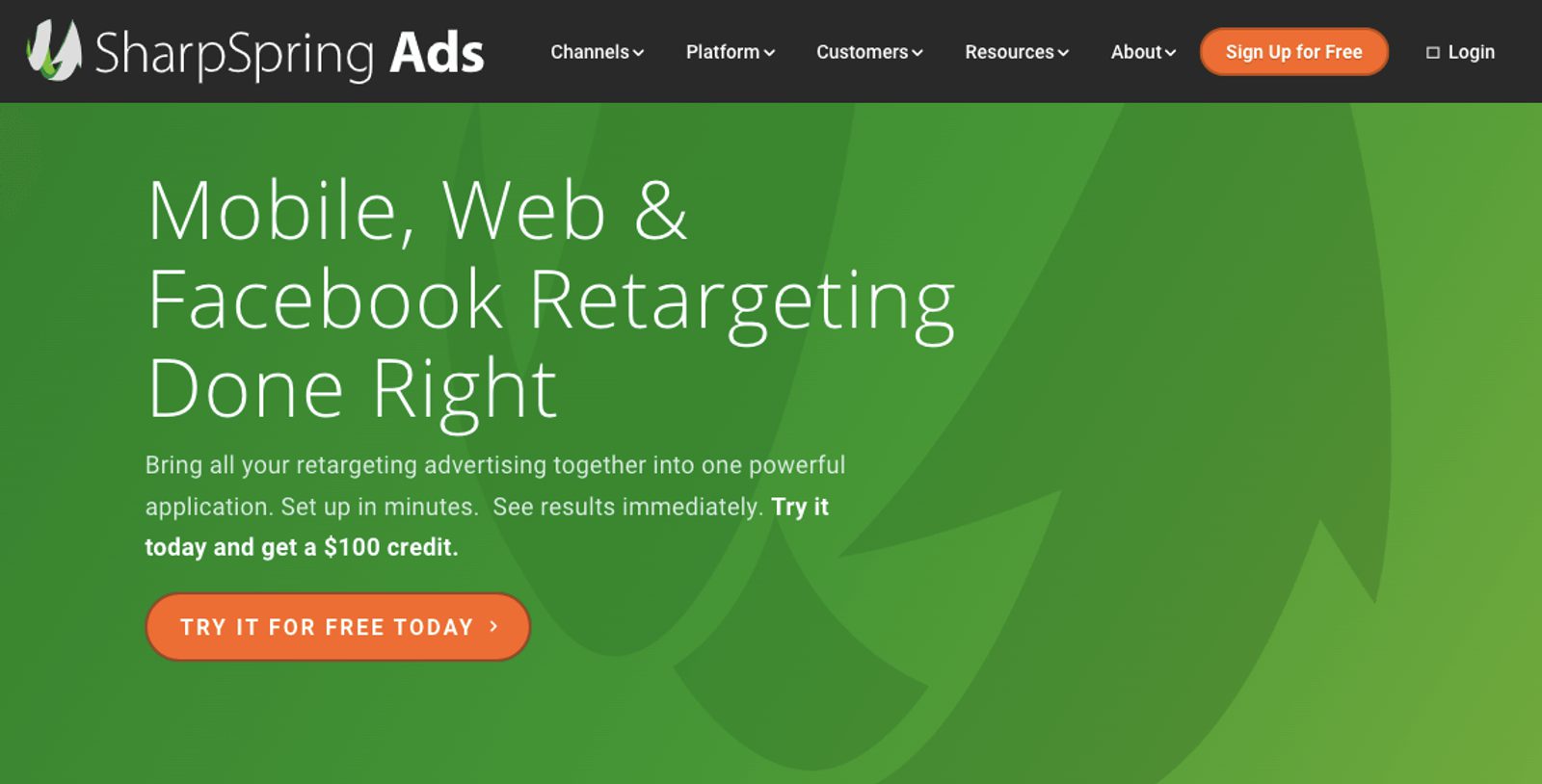
Standout features
- Ads dashboard: SharpSpring Ads comes with a central dashboard to show how ads perform across platforms. The dashboard itself is customizable, so you see what matters to you.
- Cross-device retargeting: Taking retargeting to another level, SharpSpring Ads allows you to retarget customers on their various devices.
SEO/SEM tools
In a digital world ruled by search engines, SEO and SEM tools show how your websites and properties perform and help you identify opportunities to get found. Look for a tool that can crawl your website and alert you to mistakes and opportunities to rank.
1. Ahrefs
Ahrefs is an all-in-one SEO digital marketing tool that helps you optimize your website, research your competitor's backlinks, monitor your rankings, and more.

Standout features
- Site audit: Ahrefs will crawl your website and analyze how each page performs, from load speed to incoming and outgoing links to content quality.
- Rank tracker: Page rankings are always in flux between search engines updating and competitors cranking out content. Ahrefs’ rank tracker monitors your search rankings for your chosen keywords in 170 countries.
2. Moz Pro
Moz Pro is 1 of the most popular SEO tools. It helps improve your site visibility by analyzing and optimizing each page.

Standout features
- Keyword Explorer: Moz Pro offers its own keyword research tool that promises accurate volume and competition metrics and insights into how customers are searching for your brand.
- Link Explorer: Along with crawling and auditing your site, Moz Pro helps you tap into the SEO power of links. See incoming and outgoing links with domain authority and page authority.
3. Semrush
Semrush bills itself as a content marketing and online visibility tool. The company has added new features to its platform since launching in 2008.
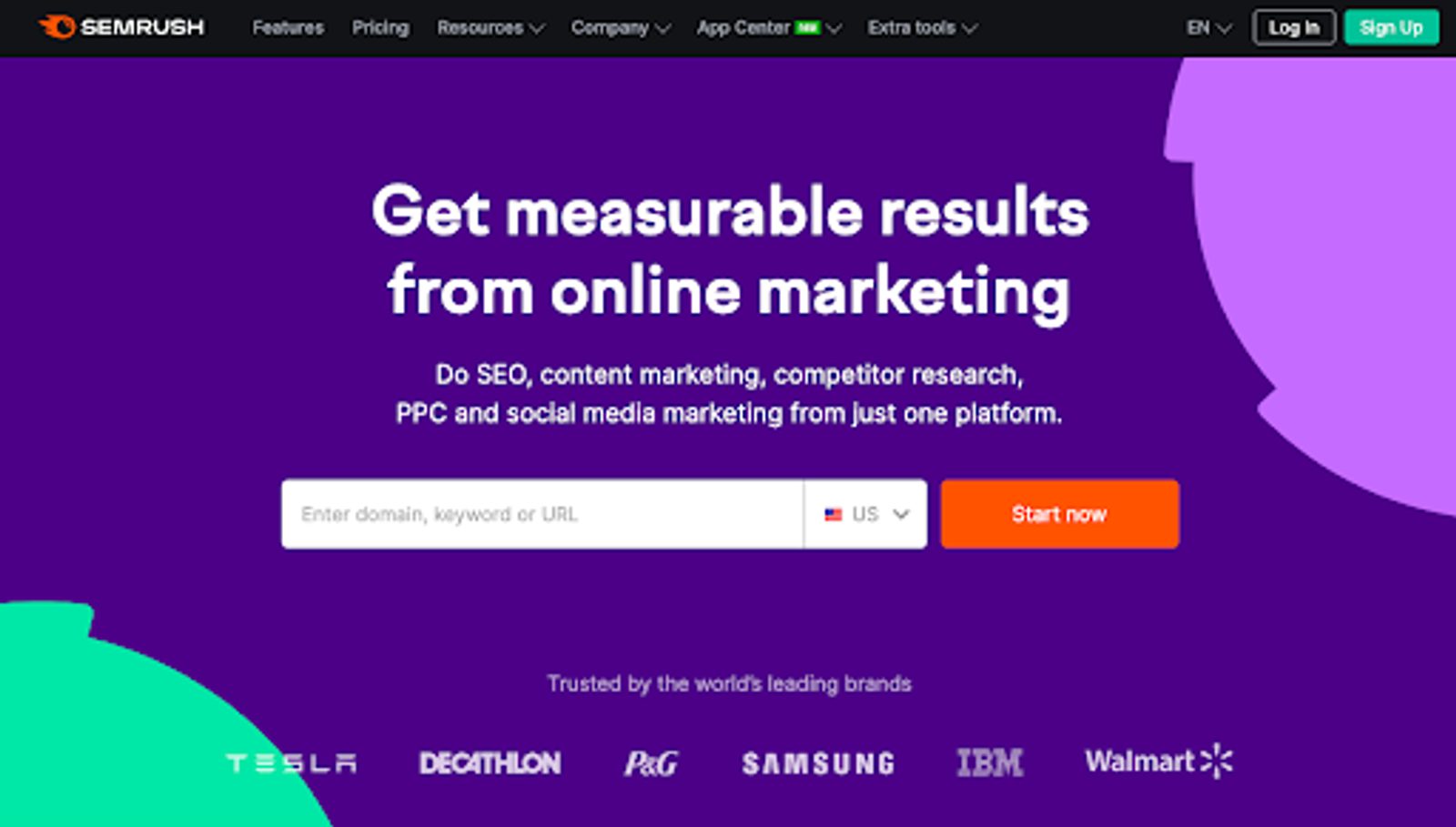
Standout features
- Content and writing tools: Semrush will serve up custom content creation recommendations when you enter your target keywords. You can then use their Writing Assistant tool to check the readability and originality of your blog posts.
- Competitor analysis: Semrush has various tools to monitor your competitors and learn what strategies are working for them (and how to one-up them). You can even analyze competitors’ backlinks and find backlink opportunities.
Frequently asked questions
Here we cover some of the most common questions about marketing tools.
What is the best marketing tool?
That depends. Most organizations will need more than 1 marketing tool, so the best tool depends on which problem you are trying to solve. The best of any category of tool will also depend on your business and its specific needs.
Why do we need marketing tools?
Marketing tools allow businesses to perform the myriad of daily tasks necessary for digital marketing. While you can do some things (social media, for example) without a designated tool, tools make it easier and more efficient. Other tasks all but require a tool. You can’t replace a CRM with just a spreadsheet.
What marketing tools do advertisers use?
Paid advertising is still an important part of digital marketing. Typically, advertisers will use a tool for search engine ads (Google) or social media ads. The most commonly used tool is Google Ads, but there’s also AdRoll, AdStage, and others.
Choose a marketing tool that does more
Modern marketing is a many-faceted endeavor. No 1 tool can do everything, but that doesn’t mean you need dozens of different tools to manage your day-to-day marketing. If you can find 1 or 2 core technologies that fulfill your most important requirements, you can add supplemental tools as needed.
Because ActiveCampaign is a standout CRM, marketing automation platform, and email marketing tool, it can help you simplify your marketing toolset. See just how much ActiveCampaign can do for your business by starting your 14-day free trial today.






